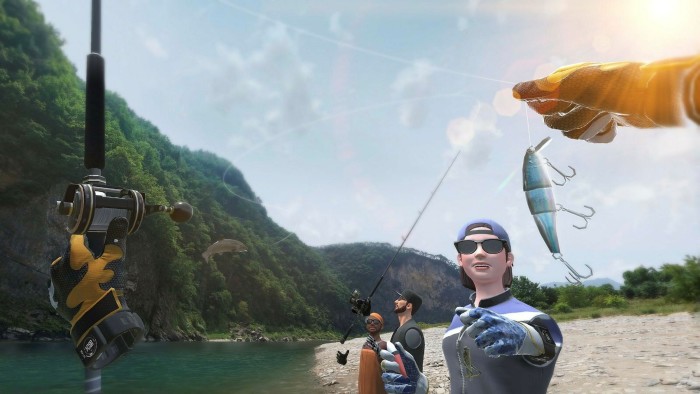South Korean virtual reality fishing game reels in 1mn users

Song Jung-a
2024년 4월 4일
Ronald Hyslop, a 73-year-old retiree living in Ontario, Canada, is a big fan of Real VR Fishing — a virtual reality fishing game made by South Korea-based Devs United Games.
He says it gives him something to look forward to each day. “I’ve always got that one species I want to go for — it is like looking forward to Christmas,” he says with a smile. “I am addicted to it. It’s more than relaxing. It is like a different reality.”
Hyslop is not alone. Nearly 1mn users are hooked on the immersive experience, which allows players to enjoy the thrill of outdoor fishing from the comfort of their couch. It has become one of the top-selling VR games in Asia-Pacific, racking up about Won20bn ($15mn) of sales since its 2019 launch, mostly from overseas markets, especially North America. Users play RVRF for an hour a day on average, nearly three times the average time spent on other VR games, according to research by DUG.
“Fishing is suitable for [relaxing in] virtual reality,” says Mark Choi, DUG’s chief executive and co-founder. “With our simulation game, you can focus on the fun without the inconvenience of physically baiting your hook.”
I am addicted to it. It’s more than relaxing. It is like a different reality Ronald Hyslop, Real VR Fishing player
RVRF, which costs $20, allows users wearing VR headsets to reel in fish in nearly 100 real-world locations, including well-known US sites such as the Grand Canyon, Yosemite, and Lake Tahoe. The 3D graphics capture a wealth of immersive detail, from shimmering water to flocks of birds in flight and clouds drifting past mountainsides.
The global popularity of the VR game has taken DUG to 43rd in this year’s FT ranking of high-growth companies in the Asia-Pacific region. The company, set up in 2016 by ex-employees of Facebook’s Oculus VR business, secured its position with compound annual revenue growth of 144.3 per cent between 2019 and 2022. That took total revenue to $4.74mn in 2022.
On the back of RVRF’s popularity, DUG attracted Won2bn of investment from SoftBank Ventures Asia in 2021, and is now planning to raise about $10mn from foreign institutional investors in the second half of this year.
Consumer spending on VR is expected to triple by 2027, reaching $5.7bn globally, according to tech consultancy Omdia. DUG plans to launch new VR games for outdoor activities such as camping and boat racing next year.
But Choi admits to still limited consumer adoption of immersive technology due to the clunky headsets and the lack of good content.
“I thought everyone would be wearing VR headsets by now, but the devices are still too inconvenient. They should be lighter and simpler like glasses for daily use,” he says. “A lack of killer apps is also a problem.”
However, he expects the VR games market to take off in three to five years as the launch of Apple’s Vision Pro headset earlier this year piques the interest of game developers. Google and Samsung are also in collaboration on a new mixed-reality device.
Meta controls more than half of the VR market with its Quest 3 headset, according to IDC. The market researcher predicts VR/AR [augmented reality] headset shipments will grow 44 per cent to 9.7mn units this year, driven by new products from Apple and Meta, after a 24 per cent drop last year.
DUG hopes to become a global producer of extended reality content, like China’s Tencent is for online games. The aim is to be listed on Nasdaq in five years and to become a company worth Won1tn.
“We want to become a company like Tencent in the looming XR [extended reality] era. We are going to invest in, and produce, all kinds of interactive content,” says Choi.
In total, South Korea, with a population of 52mn people, is home to 124 companies in the latest FT ranking.
These include: ABL Bio, an anticancer biopharmaceutical company with a 2019-22 compound annual growth rate of 156.5 per cent, which is ranked 36th; Hylium Industries, a hydrogen-related business operator ranked 47th; and Unimewo, a healthcare platform in 68th place.
Shares in ABL Bio have surged nearly 30 per cent on heavy retail buying over the past six months in expectation of its development of new anticancer drugs.
ABL Bio is the first Korean biotech with a bispecific antibody platform — designed to lock on to two cellular targets — that is undergoing clinical trials. It is seen as a pioneer in the application of these antibodies for cancer immunotherapy and neurodegenerative conditions such as Parkinson’s disease.
The company is set to present its latest studies at the American Association for Cancer Research (AACR) annual meeting in San Diego on April 9. Progress in clinical trials has been promising, says chief executive Lee Sang Hoon. “As more big pharmaceutical companies show interest [in our work], we will make the AACR event an occasion to sign global partnerships.”
But the South Korean companies with the highest 2022 revenues of all in the FT ranking were property developer Rsquare, with $142.5mn, and ecommerce platform Ably, with $138mn.
